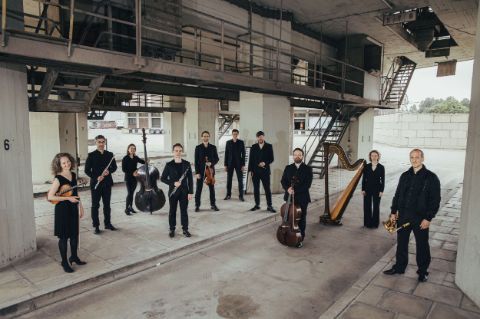Zafraan Ensemble
Concert
Fri., 1.3.2024
21:00
Miriam Makeba Auditorium
Free entry

Zafraan Ensemble. Photo: Anton Tal
For the opening of Echos der Bruderländer, the Zafraan Ensemble curates a programme that invites the audience to engage with historical ruptures, political ideals, and contradictions through sound. The programme assembles a broad spectrum of oeuvres from composers that came from the so-called brother countries and worked in the German Democratic Republic (GDR) for some time, as well as others from Germany who publicly called for solidarity with other socialist and communist states. The Zafraan Ensemble presents this programme together with guitarist and composer Đặng Ngọc Long and the multi-instrumentalist and composer Regis Molina as guest musicians.
Programme:
Paul Dessau
From: Suite für Altsaxophon und Klavier [Suite for Alto Saxophone and Piano] (1935)
4th movement: 3 Variationen über ein mongolisches Volkslied [3 Variations on a Mongolian Folk Song]
4'
Reiner Bredemeyer
From: Triostücke 4 für Klarinette, Viola und Klavier [Trio Pieces 4 for Clarinet, Viola, and Piano] (1985)
3rd and 4th movement
5'
Đặng Ngọc Long
From: Suite Kiều (2016/2021)
Prelude, Kindheit, Sturm, Wiedersehen [Prelude, Childhood, Storm, Reunion]
(Guitar solo, arrangement for guitar and Zafraan Ensemble)
10'
Leo Brouwer
Exaedros I für 6 Instrumente [Exaedros I for 6 Instruments] (1969)
10'
Ruth Zechlin
Mobiles für Harfe Solo [Mobiles for Harp Solo] (1978)
(World premiere)
6'
Klaus Renft Combo
Ketten werden knapper [Chains Become Scarcer] (1973), Chilenisches Metall [Chilean Metal] (1974)(Arranged by: Regis Molina)
7'
Paul Dessau (1894, Hamburg–1979, Königs Wusterhausen)
In 1948, Paul Dessau returned from exile—which he spent first in France and then in the US where he collaborated with Bertold Brecht for several years—back to Germany and settled in East Berlin. He consciously chose the Soviet occupation zone in Germany, which later became the GDR, in the hope of helping to build a socialist and democratic Germany. Until his death, he felt artistically, politically, and morally committed to this idea, even though he came into conflict with the cultural authorities from the very beginning. Dessau was known as a crucial spokesperson in the discussion around socialist realism in the art in the GDR, and was involved in establishing various music institutions. He also spoke up for solidarity with Chile—politically as well as compositionally.
Reiner Bredemeyer (1929, Vélez–1995, Berlin)
In 1954, Reiner Bredemeyer moved from Munich to East Berlin to do a postgraduate course taught by Paul Dessau. From 1977 to 1989, he was a board member of the association of composers and musicologists in the GDR. After his death in 1995, the musicologist Jürg Stenzl wrote: ‘Reiner Bredemeyer interfered everywhere with his music, with sharpness and pizzazz, with un-German wit and cheerfulness, cheeky and just like Villon and Heine, whom he admired like Arno Schmidt. He objected on occasions where there was nothing to gain for him’. Among other poets, Bredemeyer melodized the texts of Cuban poet Nicolás Guillén who felt committed to Afro-Cuban tradition.
Đặng Ngọc Long (1957, Nghệ An; lives in Berlin)
Professor Đặng Ngọc Long is a concert guitarist, composer, and actor. He studied classical guitar at the Hochschule für Musik Hanns Eisler Berlin and studied under Inge Wilczok from 1985 to 1993. Today, Đặng Ngọc Long is Artistic Director of the International Guitar Competition & Festival Berlin and Director of the Berlin-Gesundbrunnen Music School. In 2009, Đặng Ngọc Long was awarded the title of Honorary Professor by the University of Kyrgyzstan.
Leo Brouwer (1939, Havanna; lives in Havana)
Leo Brouwer is a classical guitarist, conductor, and is known as one of the most popular contemporary Cuban composers. His guitar pieces have been played and taught by professor Inge Wilczok at the Hochschule für Musik Hanns Eisler in East Berlin. Together with Morton Feldman, he was a fellow of the DAAD Artists-in-Berlin Programme in West Berlin in 1972. Brouwer had to end his career in the early 1980s due to an injury. He composed works for guitar, piano, percussions, and orchestra as well as music for ballet and film.
Ruth Zechlin (1926, Großhartmannsdorf–2007, Munich)
In 1950, Ruth Zechlin became a lecturer at the Hochschule für Musik Hanns Eisler in East Berlin, which was founded in the same year, and took up a professorship for composition there in 1969. In 1990, she became Rector of the university and was Vice President of the Akademie der Künste zu Berlin from 1990 to 1993. Zechlin composed chamber music and orchestral works as well as music for radio plays and films. As a concert harpsichordist, she has traveled numerous European countries. On 28 October 1989, a few days before the fall of the Wall, she took part in the event Gegen den Schlaf der Vernunft (Against the Sleep of Reason) at the Erlöserkirche in East Berlin alongside many other artists and intellectuals. Zechlin's composition Mobiles für Harfe Solo has never before been performed in front of an audience.
Klaus Renft (1942, Jena–2006, Löhma)
Klaus Renft Combo (1958 founded in Leipzig, banned in 1975 by the GDR authorities, active again since 1990)
In 1958, Klaus Renft founded the Klaus Renft Combo, which, after a temporary performance ban and a change of name, was active again under its originary name in the GDR from 1967. Their songs often deal with state repression ("Ketten werden knapper"), are multi-layered to ambiguous ("Zwischen Liebe und Zorn", "Ermutigung" or "Nach der Schlacht") and question the ideal set by state power. In 1975, the GDR Ministry of Culture withdrew Renft’s license as a musician, which led to the band’s dissolution. He applied to leave the country for West Germany and moved to West Berlin in 1976. In 1990, former members of the Klaus Renft Combo got back together and have been active in changing line-ups ever since.
Zafraan Ensemble:
Martin Posegga, saxophone
Liam Mallett, flute
Miguel Pérez Iñesta, clarinet
Clemens Hund-Göschel, piano
Emmanuelle Bernard, viola/violin
Anna Viechtl, harp
Guest musicians:
Regis Molina, percussion
Đặng Ngọc Long, guitar